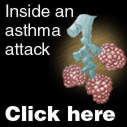Most of us don't think twice about breathing. We inhale and exhale more than 17,000 times each day, usually without considering the wonder of this simple act.
But for the 25 million Americans who have asthma, the ability to breathe is nothing to take for granted.
Asthma defined
Asthma is a chronic lung disease. It's marked by coughing, wheezing, shortness of breath and tightness in the chest.
The National Institutes of Health defines asthma by three features:
- Inflammation or swelling of the airways.
- Increased airway sensitivity to a variety of triggers.
- Temporary narrowing of airways.

The basic cause of asthma is still not known. And there is no cure for the disease.
Researchers have learned that asthma involves a type of inflammation of the airways that tightens airway muscles, produces mucus and causes the airways to swell.
The airways of a person with asthma overreact to small amounts of substances or to events that wouldn't bother a person without asthma.
This response—to pollen, dust, smoke, exercise or other allergens—causes the muscles that surround the airways to constrict. The person feels tightness in the chest, has difficulty breathing, and coughs or wheezes.
A potentially serious problem
For some people, asthma causes only infrequent, minor problems.
For others, the disease results in more serious symptoms, with daily periods of breathing difficulty and occasional episodes (sometimes called flare-ups or attacks), which can be serious enough to require emergency medical care. Without proper treatment, asthma can result in death.
According to the American College of Emergency Physicians (ACEP), fatal asthma attacks are more common in people who aren't effectively controlling their asthma triggers or haven't been following their treatment plan regularly.
What you can do
According to ACEP, you should seek immediate medical help if someone with asthma:
- Uses rescue inhalers but symptoms do not quickly improve.
- Has to hunch forward, sit or stand to breathe easier, or can't speak in full sentences.
- Has lips or fingernails that are turning blue (or gray for people with dark complexions).
- Experiences persistent shortness of breath even when lying down.
- Strains to breathe or cannot finish a sentence without pausing for breath.
- Experiences chest tightness, or agitation, confusion or an inability to concentrate.
Additional sources: American College of Allergy, Asthma & Immunology; American Lung Association; Centers for Disease Control and Prevention
Reviewed 8/15/2025